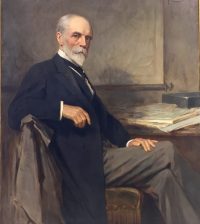. . . [I] spent the morning dictating some new points on the Spanish paper and revising some others, Senator Davis seemed particularly interested in this, and I read to him what I had written on the subject of the Philippines. He expressed great satisfaction with it. So did Senator Frye when he heard it. Judge Day was less enthusiastic, but equally positive in his approval, and he carried it off together with all my other memoranda to be incorporated in the paper. I said that, so far as I was concerned, there was no reason why our paper should not be ready for presentation this afternoon; but he [Frye?] insisted that on other grounds it was quite impossible, and said we would have to exercise the liberty we had reserved for postponing the meeting. From something someone else said, I suspect he has cabled the President for permission to use his name in some way in distinct confirmation of Day’s own statements about what happened before the protocol. There is a subdued, but rather strong, feeling that Cambon was so anxious to achieve the signing of the [armistice] protocol that he concealed some things from the Spanish government.
Senator Gray strolled in an hour and a half after we had been [in} session, and just as Day was going off with all my memoranda. It struck me that [Day] was a little inclined not to let Senator Gray know of these contributions, the Senator on a previous occasion [having] expressed the opinion that it would be better if Moore prepared all the correspondence in the form of tentative drafts to be subsequently revised and patched in the meetings of the Commission. …
Addition to No. 19th, 1898 [sic].
[In the evening I had dinner at the Westminster Hotel with our Minister to St. Petersburg and Mrs. Ethan Allen Hitchcock.] Mrs. Don Cameron and the Ambassador [Horace Porter?] were also Mr. Hitchcock’s guests. He [Hitchcock?] interested me with his curiously strong Russian views about their right to Chinese ports as an outlet to their railroad through Siberia, and to save their fleet from being ice-locked in the winter. A nation, he argued, has the same right as an individual to force an outlet to the highway. In this case he thought the Pacific Ocean was the highway, and a harbor free from ice the necessary outlet. He considered the English claim to being champions of the open door singularly unfair, and protested that they exacted [special privileges] as well as other nations [did]. After some talk, however, he was rather inclined to assent to my view that the imposition of duties in no way conflicted with the open door policy; that the only necessity was that these duties should be uniform to all comers of whatever nationality; and that it would be absurd for us to talk about an open door in the Philippines in the sense of abolishing custom houses, since that would compel us to support the expenses of Philippine administration ourselves, or else resort to very | different internal taxation.
